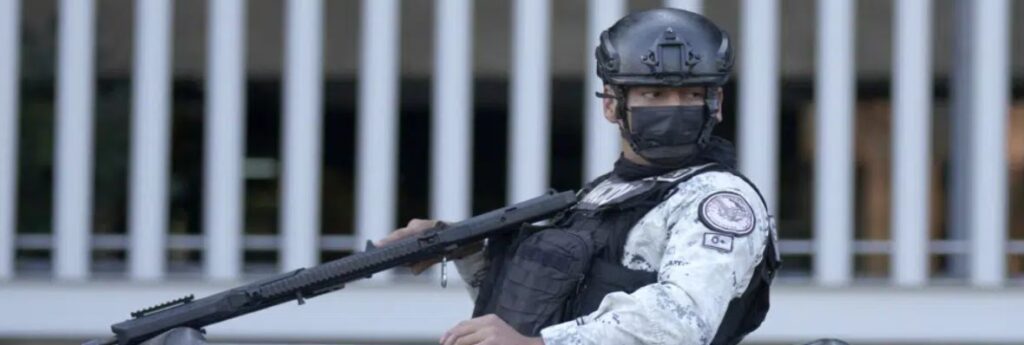As two airports in Mexico’s Sinaloa state reopened on the weekend, enabling Canadians to begin to make their way home after being in shuttered in hotel rooms for days, Mexican officials described the violence that erupted in the region after the arrest of an alleged drug king pin as nothing short of a “war zone.”
Like a scene from the movies, the operation to detain Ovidio Guzman – son of imprisoned drug lord Joaquin “El Chapo” Guzman – unleashed firefights in the northern city of Culiacan that killed 10 military personnel and 19 suspected members of the Sinaloa drug cartel. Defense Secretary Luis Cresencio Sandoval said cartel gunmen opened fire on troops with .50-caliber machine guns.
The violence carried over to the popular tourist town of Mazatlan.
Sandoval said the army responded to resistance by the cartel to the arrest by calling in Blackhawk helicopter gunships on Thursday to attack a convoy of 25 cartel vehicles, including truck-mounted gun platforms. The cartel then opened fire on the military aircraft, forcing two of them down with “a significant number of impacts,” then sent hordes of gunmen to attack fixed-wing aircraft, both military and civilian, at the city’s international airport.
Two civilian airlines were hit. The gunmen also shot up airport buildings in a bid to prevent authorities from flying the captured cartel boss out of the city. But Sandoval said authorities, anticipating the resistance, had loaded Ovidio Guzman onto a military helicopter to fly him back to Mexico City.
The Mexican administration bagged the high-profile cartel figure just days before hosting US President Joe Biden; Samuel González, who founded Mexico’s special prosecutor’s office for organized crime in the 1990s, said Guzmán’s capture was a “gift” ahead of Biden’s visit.
Juan Carlos Ayala, a Culiacan resident and Sinaloa University professor who studies the sociology of drug trafficking, said Ovidio Guzmán was an obvious target at least since 2019. “Ovidio’s fate had been decided. Moreover, he was identified as the biggest trafficker of fentanyl and the most visible Chapos leader.”
The running shootouts killed one Culiacan policeman and wounded 17 police officers and 35 military personnel.
At Culiacan’s airport, an Aeromexico flight waited for its chance to take off as two large military planes landed with troops, as did three or four military helicopters, and marines and soldiers began deploying along the perimeter of the runway.
When the commercial airline flight was finally preparing to accelerate, passengers heard gunshots in the distance. Within 15 seconds the sound was suddenly more intense and much closer, and passengers threw themselves to the floor, some said.
They said they did not know the plane had been hit by gunfire until a flight attendant told them. No one was injured, but the plane hastily retreated to the terminal.
Helicopters patrolled the skies. One restaurant that remained open was packed.
Ayala said the atmosphere was calmer Friday “but there are still a lot of burned-out vehicles blocking the streets.”
Canadian response
On Thursday, the Canadian government warned its citizens in the region to limit movement and “shelter in place” and by Friday, Canadian tourists remained barricaded in their hotels amid the ongoing violence. Some, who had been scheduled to fly out Thursday night, were thwarted when street fighting closed the airport in Mazatlan and buses that were to take them there were burned in front of the hotel.
Stranded travellers who had checked out of their rooms but whose flights were cancelled, were reported to have slept in their hotel lobby, the gates of which remained barricaded, and military and police vehicles trundled up and down beaches that had been recently full of suntanning vacationers.
The federal government on Friday was continuing to advise Canadians to stay inside, avoid crowds and demonstrations and not to try to cross blockades, even if they appeared unmanned.
On Saturday, travellers checking out of beachfront hotels in the area described a chaotic scene of packed elevators and busy lobbies as guests await airport shuttles and flights home.
WestJet said it had cancelled two flights in and out of Mazatlan on Friday. Air Canada said none of its flights were affected by the unrest. In an advisory on its website Sunwing noted that southbound departures to Mazatlan on Friday had been cancelled and northbound flights were delayed. Customers were advised to remain in their hotels until their new return flights were confirmed and to refer to their destination representative for updated transfer times.
The scope of the several days of violence was such that Sinaloa Gov. Ruben Rocha said cartel gunmen showed up at local hospitals trying to abduct doctors and take them away to treat wounded fighters. “It got to the point that at one moment the doctors were saying ‘we’re getting out of here,’” he recalled, saying police had reinforced security and convinced the doctors to stay.
Culiacan residents posted video on social media showing convoys of gunmen in pickup trucks and SUVs rolling down boulevards in the city on Thursday. At least one convoy included a flatbed truck with a mounted gun in the back.
But despite the violence, many Culiacan residents may still support the cartel, says Ayala, explaining that it may be because of the money the gang brings to the region, but also because locals know that even after federal troops withdraw, the cartel will still be there. As bad as it is, the cartel has ensured relative stability, if not peace.

